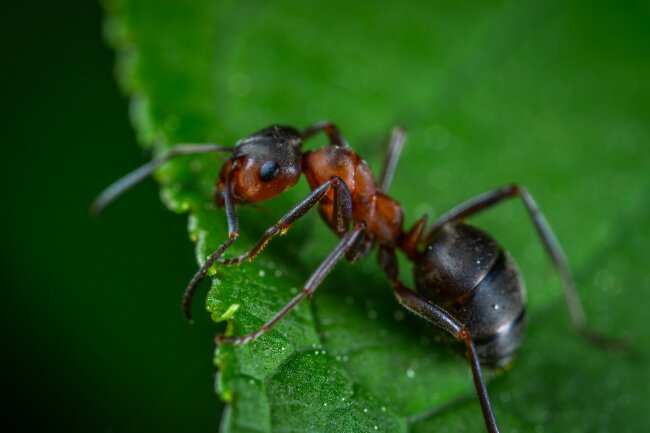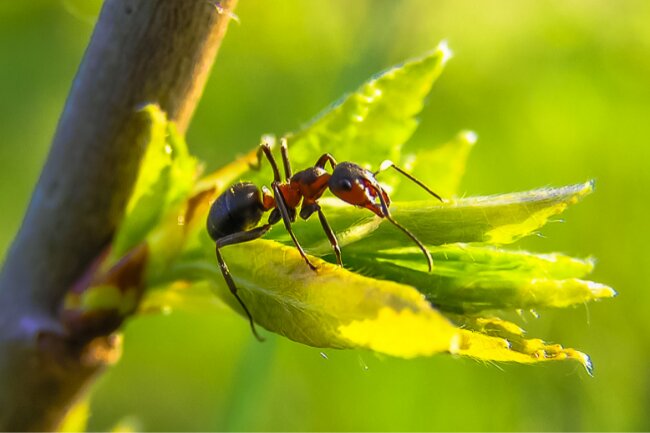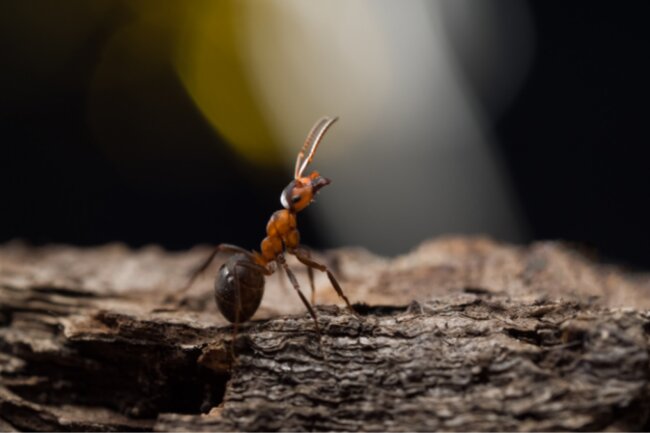Ants do sleep, though it’s not quite in the same way we do. They take short power naps throughout the day at regular intervals. How long they sleep depends on the species and the type of ant.
Contents
What is sleep?
Sleep is an altered state of consciousness brought about by the release of certain hormones. During the sleep period animals become less active and their muscles relax, however, it isn’t a completely passive state, with areas of the brain still functioning.
The amount various animals sleep varies greatly, as does the time of day they sleep. However, most animals require sleep to survive. Sleep deprivation can cause problems in memory recall and difficulties in completing activities, however, a long-term lack of sleep can result in death.
Ants are often used as examples of hard-working and efficient labourers. The idea of them resting is rarely considered. Yet, like all animals, ants do require sleep in order to function correctly.
How do ants sleep?

It is often hard to tell when invertebrates are sleeping. This is because there are other states which invertebrates enter into that appear similar to sleep, such as diapause. Diapause is a state similar to hibernation when insects become inactive.
They usually enter this state during cold periods, such as overwinter, or when food becomes scarce. In this state, they rarely move, and their metabolism slows, meaning they don’t need to eat.
| Characteristic | Description |
|---|---|
| Duration | Ant sleep periods typically last for a few minutes to a couple of hours |
| Location | Ants may sleep in the nest, on surfaces, or in special chambers |
| Reduced activity | During sleep, ants exhibit decreased movement and responsiveness |
| Resting positions | Ants may assume various resting positions, such as curled or motionless |
| Sleep cycles | Some ants have multiple sleep cycles within a 24-hour period |
| Colony Role | Sleep Patterns |
|---|---|
| Worker ants | Workers may exhibit individual sleep patterns or synchronized rest |
| Queen ants | Queens have less frequent sleep periods compared to workers |
| Brood care | Ants involved in brood care may have reduced sleep activity |
| Foragers | Foraging ants may have irregular sleep patterns due to their tasks |
| Soldiers | Soldier ants may have shorter and more frequent sleep episodes |
Insects can also become inactive in the cold. This is because insects do not make their own heat and need external warmth to allow themselves to move. Being sure whether an insect is cold, in diapause or asleep is hard to tell. In general, a sleeping ant will cease moving, and the antennae will droop.
Ants do not have eyelids, meaning that they do not close their eyes to sleep. However, it’s harder for sleeping ants to be roused by external stimulation. Interestingly, ants do appear to be able to have different kinds of sleep, with deeper sleep and a more shallow sleep appearing to occur.
During this deeper sleep, queen ants have been observed with their antennae twitching, which has been suggested to be similar to our eyelids moving when we are in REM sleep. It’s thought that during this deep sleep, ants are even able to dream.
Also read: “Do Ants Migrate?” How do They Survive Winter?
When do ants sleep?
It appears that ants don’t sleep all at one time, or even over large periods of time. Instead, worker ants appear to take power naps throughout the day. Studies on fire ants have shown they will sleep for a few minutes at a time, several hundred times a day. In total, they will sleep for around four hours a day.
The benefit in not all sleeping at the same time is that there are always ants within the colony working, able to bring in food or defend the nest. However, it has been found that workers will take advantage of quiet periods to sleep more. These quiet periods vary between different species, as some ants are nocturnal and some are active in the daytime.
Where do ants sleep?

Some animals have specific places where they go to sleep, such as nests or burrows. These are places that are usually safe and warm, hidden from potential predators.
Other animals will happily sleep wherever they find themselves, such as seals sleeping on rocky outcrops or lions napping in the long grass. These tend to be animals that have fewer concerns that predators will get them because they are at the top of their food chain, or they are sleeping somewhere their predators can’t reach them.
For ants, they are definitely not at the top of the food chain with many animals, from lizards to birds to other insects, considering them a tasty snack.
While ants don’t appear to sleep at particular times, it is likely they will choose to sleep in places where they feel safe from danger. The best place for them to rest is likely to be inside of their nest, where there are plenty of other ants to protect them and they are not exposed.
However, they may choose to sleep outside if they are in a hidden location, such as the underside of a leaf. As it’s fairly rare to catch napping ants out in the open, it’s safe to say they rarely if ever sleep outside the nest or another form of protection.
As well as worker ants, the sleep patterns of fire ant queens have been studied. It’s been found that queens sleep for longer periods at a time, usually around six minutes. Their sleep is also more regular, adding up to roughly nine hours a day.
The perks of being royalty may mean they have more time for sleep, with workers busy bringing them food and protecting them from danger. Alternatively, it may be that they require more sleep, as they are working hard producing the next generation of workers.
Whatever the reason, it’s thought this extra sleep may be one of the reasons why queen ants live so much longer than workers, the workers lasting only six months while queens can live up to fifteen years.
Also read: Do Ants have Brains? The Purpose of Ganglia Explained
Why do ants sleep?
Ants sleep for the same reason that all animals sleep, to allow the body to rest and repair. Lack of sleep can make basic tasks more difficult and cause health to diminish.
Over time, this damage to health can cause death. While worker ants are more expendable than queens, it is still better that they are allowed to experience the benefits of sleep, as it makes them more efficient and extends their lives.
Do ants sleep at night?

Many ant species are active at night. This is in part because their predators may be less able to see them at night, or because it is easier for them to locate their food.
For species that are active in the day, we may assume that their disappearance at night means they have all headed to bed. In fact, they are still active within the nest at this time, we simply aren’t able to observe them.
Both nocturnal and day-active species will sleep during the night and day, as their power naps are short and regular. It is likely that they may take advantage of the quieter periods when they aren’t leaving the nest to nap more.
It has been found that nocturnal ant species may move slower. This may be because it is cooler at night, meaning they have lower energy levels.
Also read: How do Ants Communicate? (Different Ways & Situations)
How long do ants sleep?
How long ants sleep varies between species, and within colonies between the castes. It also depends on how busy they are.
The shorter naps of the workers appear to be less than a minute to four minutes at a time, whereas queens will nap up to six minutes at a time.
How do ants sleep?
Ants sleep by pulling in their antennae and remaining still. As they don’t curl up into a ball or close their eyes, it can be hard to spot a sleeping ant. The main indication will be that that ant isn’t moving. After emerging from sleep, the ant may be more sluggish.
The big winter sleep
Diapause isn’t technically a type of sleep, it’s simply a way to avoid the harshest conditions of the year. During this time, ants can use a number of methods to survive. Even during diapause, if they become too cold, they can freeze to death.
In order to keep themselves warm enough, they usually find places to shelter. This can be underground in their burrow. They may dig deeper to whether the earth stays warmer. Another clever trick can be to bury under a rock. The rock will trap the heat from the sun and radiate it back out to the ants.
Another clever heat source ants utilise is decomposing plant matter, such as rotting wood or leaves. Spending their time in leaf litter or beneath rotting bark can help provide them with enough warmth to survive.
Also read: 10 Different Methods That Explain How Ants Survive the Winter
Sleepy ants
To us, it may not sound very relaxing to grab a quick few minutes several times a day. In fact, even the ants themselves would seem to prefer more rest, as they choose to sleep longer when the opportunity presents itself.
Luckily for us, we often have the luxury of being able to get along and restful nights. So ants probably are harder workers than we are, or perhaps they simply can survive on less sleep.

